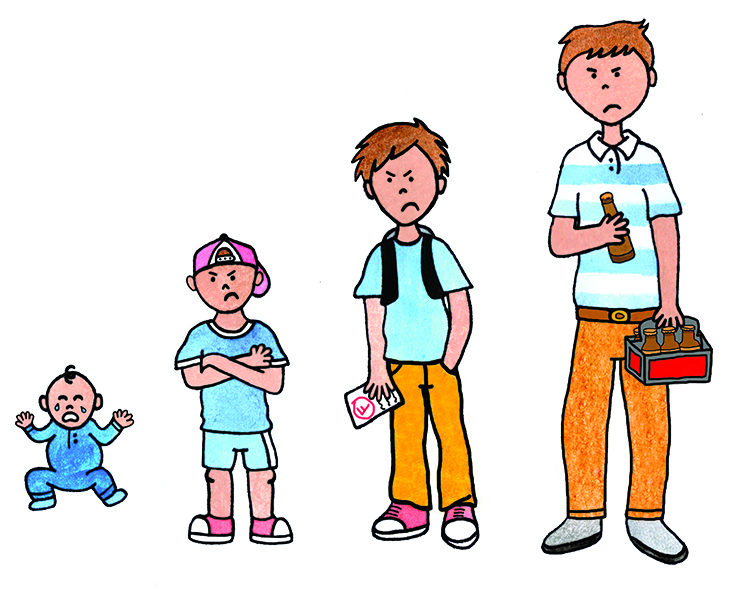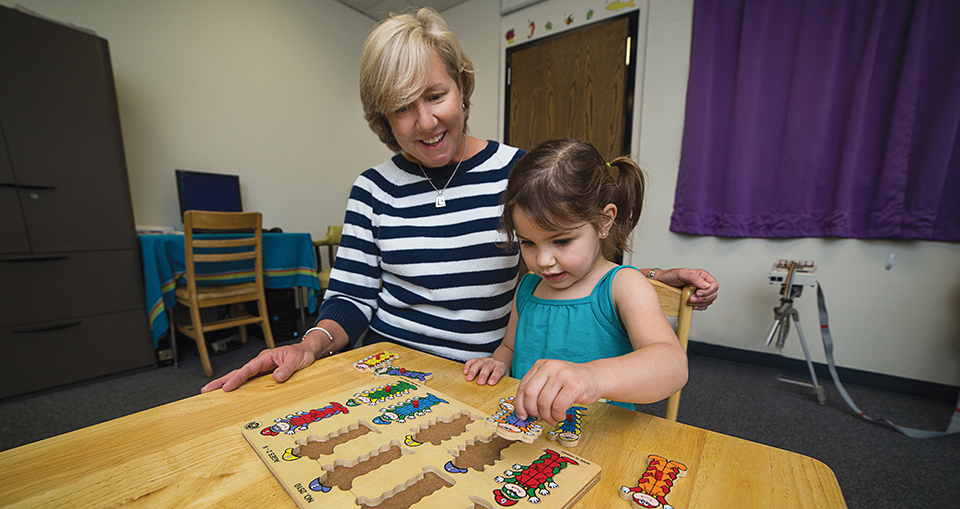Redacted from “Right from the Start,” spring 2016 UNCG Research Magazine
Although school carries an inherent focus on grades, academic ability isn’t the only factor determining whether a child is actually classroom-ready. Another key indicator is whether he or she can appropriately regulate emotions, says Dr. Susan Calkins. “The more structured preschool and school environments present a unique set of challenges to children — challenges that require emotional readiness.”
If you visit the Human Development and Family Studies (HDFS) professor’s lab while her team collects data, you’ll observe children singing, counting, or playing games. Others might be crying and flailing fists. They’re expressing a wide range of emotional abilities, dependent on their age and experiences.
While some children control their impulses by employing various learned strategies, others lack these skills and have trouble delaying gratification or managing frustrating tasks. Their negative emotional responses indicate immature emotional readiness.
“Being able to manage emotions is critical for academic achievement, school readiness, and mental health,” Calkins explains. Without emotion regulation skills, children can’t establish positive student-teacher and peer-to-peer relationships. If they can’t express themselves or manage their feelings in age-appropriate ways, they also risk social rejection. “If children don’t master emotional regulation, they face challenges for years to come.”
To help children reach appropriate levels of emotional maturity, adults must recognize their natural responses and know how to handle them, Calkins says. To find the tools parents and caregivers need, she and her team have recruited children from more than 450 families to participate in the RIGHT Track study.
Although we can begin to understand emotion regulation by observing the behavior of and collecting information from children and their caregivers, collecting data at the physiological level also provides a key piece of the puzzle. Physiological data helps researchers understand how emotional regulation develops and the degree to which it impacts various areas of the child development.
In one component of the study, Calkins’ team attaches heart rate electrodes to each child to measure their physiological arousal and then presents them with a frustrating task. Two-year-olds are asked to open a cookie jar that was glued shut or wait to open a present, while 5-year-olds are tasked with unlocking a box using a set of keys that does not actually include the correct key.
The team watches both the child’s actions as well as the caregiver’s responses. Did the children quit or did they stick with the task? Did the parent offer guidance or withdraw from the situation? Children and parents return to the lab for more advanced tests as they age.
“So far, we’ve seen that children who get extremely frustrated with these tasks also experience behavior problems,” Calkins says. “These kids who lack skills to control their emotions and cope are also more likely to experience depression and academic and health issues and to engage in substance abuse and risky sexual behavior later in life.”

There are many ways children can rein in overwhelming feelings. Distractions, such as singing songs, diverting concentration, or engaging in self-soothing behaviors, can effectively control emotions.
Knowing how to implement these behaviors helps a child navigate social and academic environments, says Calkins. They also help children stay focused on tasks and enhance their autonomy. When children have these skills, they can approach difficult situations without adult intervention.
Calkins’ findings are important not just for parents but for educators too. Early development of a positive teacher-student relationship can help children sidestep many of the aforementioned problems. “This is critical knowledge, especially in today’s kindergarten climate where we’re getting young children ready for a series of tasks and tests.”

The best foot forward. It’s what we all want for our children in those first few years. But, the question is — how do we get there?
Nationally and locally, debates rage. It’s difficult to find consensus on the best way to educate our children or even prepare them to be educated. One thing we can be sure of? It’s no simple task. It will require a lot of work and collaboration to get it right.
UNCG is leading the way. Here, researchers have investigated — sometimes for years — what it takes to make sure children are healthy and ready to learn. And, now, investigators are combining their knowledge, resources, and networks to meet these challenges directly.
Faculty and staff, from the UNCG Department of Human Development and Family Studies to the UNCG Center for Youth, Family, and Community Partnerships, conduct basic research, translate research into evidence-based practice, and help create local, state, and national educational policy. As they reach out to families, help towns and cities identify and intervene with struggling children, and teach professionals vital skills for the classroom, these investigators have one goal in mind — giving every child the right start.



